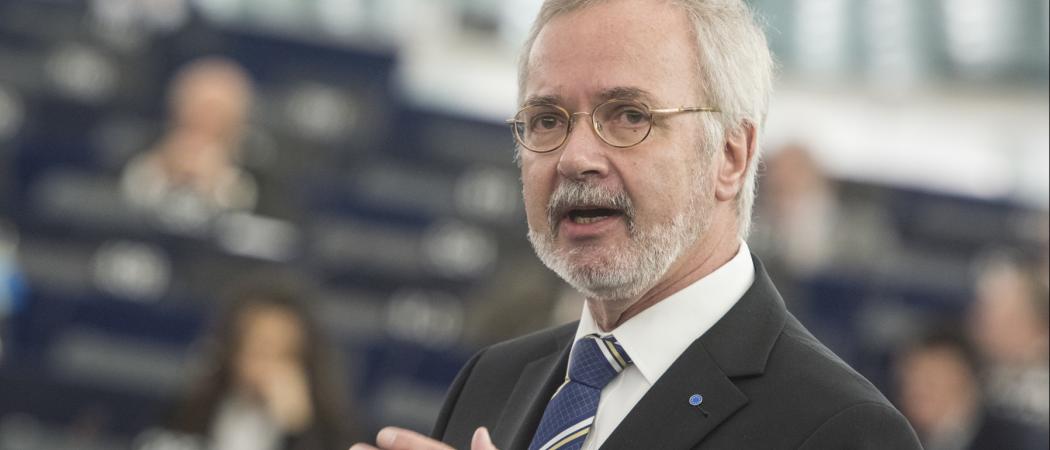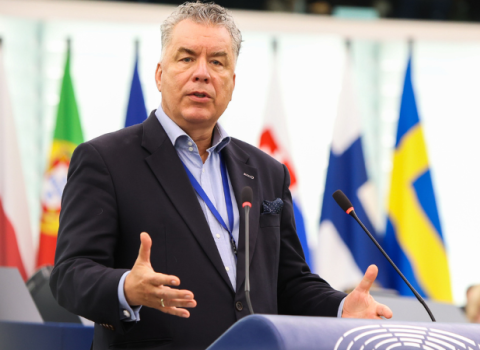Fiscal stimulus plan has to date unlocked €257B in public and private funding for infrastructure projects across the EU, the president of EIB told MEPs, as he defended fossil fuel investments and anticipated the fallout from Brexit

EIB president Werner Hoyer. Photo: European Union 2014 - European Parliament
The European Investment Bank (EIB) will meet funding targets set out in the Juncker plan in the next few months, according to its head, Werner Hoyer, who told MEPs earlier this week that by end of 2017 the bank had approved 717 transactions under the plan, unlocking €257 billion in private and public investment.
That is 82 per cent of the original three-year €315 billion target for the Juncker plan, Hoyer said.
On the back of good results to date, the EU has decided to double the plan’s financial capacity and duration.
The fund guarantees the riskiest parts of investments in energy, transport or telecommunication infrastructures. Deals signed include a milk processing factory and broadband network in France, new ferries and smart meters in Italy, railways and funding for a bioscience lab in Spain, renovation of a gas plant in Denmark, a hospital in the UK and a bio-product mill in Finland.
The fund’s success proves, “the EU bank is the crowding-in institution of the world,” said Hoyer.
The EIB, owned by the EU’s member states, uses capital deposits as security to fund low interest loans for research, infrastructure and environmental projects. It invests around €70 - €80 billion per year.
The bank approved a record 901 transactions in 2017, including 100 outside Europe. In total, it has raised around €3 trillion in its 60-year history. That is a good record, given the bank has taken only around €14 billion seed funding from member states, Hoyer said.
Not ready to ditch fossil fuels
The Luxembourg-based bank has recently come under fire for its approval of a €1.5 billion loan – one of its largest ever – for a gas pipeline from Azerbaijan to western Europe. The project is intended to diversify Europe’s fuel supplies, reducing reliance on Russia.
The EIB has limited investments in fossil fuel fired plants, to keep in line with the EU goal of cutting carbon emissions by at least 20 per cent by 2020, the president said.
However, it does not plan to stop investing in this area. “I cannot promise you that at a special day in the future we will have stopped financing fossil fuels. It would not be honest,” Hoyer said. “The member states that own us will say they do not follow that way.”
However, Hoyer restated the bank’s environmental principles, noting EIB is the inventor of green bonds that are issued to finance low carbon infrastructure, such as offshore wind turbines and smart grid connections.
“We are still the largest issuer of climate awareness bonds and we are the ones promoting social awareness in order to finance sustainable development goals,” Hoyer claimed.
Carrying on after Brexit
Brexit will challenge the bank’s lending capacity, with the UK expected to take back its 16 per cent stake of shareholder capital after it leaves the EU.
The country was the fifth largest recipient of EIB loans in 2016, but deals fell sharply in 2017, amid uncertainty over the future relationship with the bank.
“Brexit can break my heart but we have to accept the decision,” said Hoyer. “The UK has paid €3.5 billion into the bank over the last 40 years. [It will] get that back.”
However, Hoyer warned the UK will remain liable for its share of the EIB’s contingent liabilities. That will protect the bank “if something goes wrong,” he said.





 A unique international forum for public research organisations and companies to connect their external engagement with strategic interests around their R&D system.
A unique international forum for public research organisations and companies to connect their external engagement with strategic interests around their R&D system.